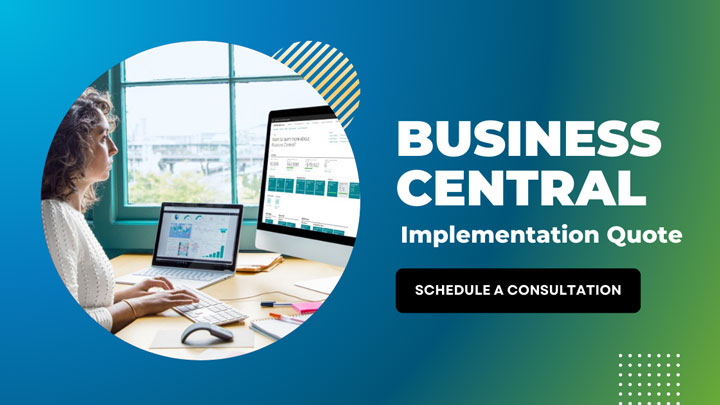You might be surprised to learn that thousands of Microsoft Dynamics 365 implementation partners exist. Your choice will affect everything from how fast you implement to your system’s long-term success.
Every business strives for greater productivity, profitability, and sustainable growth. Achieving these goals starts with choosing the right Business Central Implementation partner – one who understands your unique processes and can tailor Microsoft Dynamics 365 Business Central to deliver maximum value. A seasoned implementation partner brings the expertise to evaluate your current systems, identify inefficiencies, and guide a smooth transition to a future-ready ERP solution.
This decision can feel overwhelming. We created this detailed guide to help you review and pick the perfect Business Central implementation partner that matches your business needs. Let’s tuck into what makes a great partner and how to find one that lines up with your goals.
Getting Started with a Business Central Implementation: A Streamlined Path to Success
Implementing Microsoft Dynamics 365 Business Central doesn’t have to be complex or overwhelming. With the right approach and a trusted implementation partner, businesses – whether small, medium, or enterprise – can unlock powerful ERP capabilities quickly and efficiently.
Why Business Central Is a Smart Choice
Business Central is designed to adapt to your business needs. Its flexibility allows organizations to start with core functionality and scale up as they grow. Whether you’re a small business looking for streamlined operations or a larger enterprise needing deeper integrations, Business Central offers a tailored fit without unnecessary complexity.
Simplifying Implementation with the Right Partner
While ERP systems can involve multiple steps, a skilled Business Central implementation partner helps simplify the journey. From initial setup to go-live, they guide you through best practices, minimize disruptions, and ensure your team is supported every step of the way.
Here’s how a smooth implementation typically unfolds:
- Clear goals and alignment: Your partner helps define business objectives and align them with Business Central’s capabilities.
- Smart planning: Data migration, user roles, and workflows are mapped out early to avoid surprises.
- Start simple: Many businesses begin with out-of-the-box features, adding customizations only where they truly add value.
- Training and support: Role-based training ensures your team is confident and ready to use the system from day one.
Common Myths vs. Reality
- Myth: ERP systems are only for large enterprises.
Reality: Business Central is built for businesses of all sizes, with scalable features and pricing. - Myth: Customization makes implementation harder.
Reality: With expert guidance, essential customizations can be planned and executed smoothly, enhancing—not complicating—your system. - Myth: Data migration is risky.
Reality: A good partner uses proven tools and processes to ensure clean, secure data migration.
Thousands of businesses have successfully implemented Business Central with minimal disruption. The key is choosing a partner who understands your industry, your goals, and how to make the technology work for you.
Choosing the Right Business Central Partner: What Really Matters
Selecting a Business Central implementation partner is a strategic decision that can shape the success of your ERP journey. While Microsoft certifications like Solutions Partner for Business Applications or Gold Partner status are common among most providers, they shouldn’t be the sole criteria. What truly sets a partner apart is their ability to deliver measurable business outcomes, provide clarity throughout the process, and support your team beyond go-live.
Key Evaluation Criteria That Drive Success
Here are the factors that matter most when evaluating Business Central partners:
1. Business Impact Assessment
Look for partners who begin with a structured Business Impact Assessment. This ensures they understand your goals, pain points, and desired outcomes—not just your technical requirements. A strong assessment should include:
- ROI projections
- Process improvement opportunities
- Change management considerations
2. Transparent Pricing and Scope
Avoid surprises by choosing a partner who offers clear, itemized pricing and a well-defined scope of work. Ask for:
- Fixed-fee or milestone-based pricing models
- Clear definitions of what’s included (and what’s not)
- Change order policies and escalation procedures
3. Proven Implementation Methodology
The best partners follow a repeatable, well-documented methodology tailored to Business Central. Look for:
- Strong data migration planning
- Role-based training programs
- Post-implementation support and optimization services
If you’re currently using Dynamics NAV or Dynamics GP, selecting the right implementation partner is critical to ensure a smooth transition to Business Central. A trusted partner will assess your existing setup, map out business processes, and tailor the migration to fit your operational goals. Learn more about our expert-led Dynamics NAV to Business Central Upgrade and Dynamics GP to Business Central migration services to ensure your move is strategic, efficient, and future-ready.
4. Industry Experience and IP
Beyond general ERP knowledge, industry-specific experience is a major differentiator. Ask:
- Have they delivered projects in your industry recently?
- Do they offer pre-built templates or IP tailored to your sector?
- Can they share relevant case studies or references?
5. Team Structure and Delivery Model
Consider how the partner delivers services:
- Size & Fit: Do you prefer a global integrator or a boutique firm that matches your scale?
- Onshore vs. Offshore: What’s their delivery mix, and how does it affect communication and cost?
- Breadth of Services: Do they offer end-to-end support (change management, BI, training), or will you need multiple vendors?
6. Training Culture and Consultant Quality
Some partners invest heavily in continuous learning. For example, 360 Visibility is dedicated to team-wide training, and expanding knowledge through Microsoft-led training, and exams. Ask:
- How do they keep their consultants up to date?
- Are certified consultants important to your organization?
- What’s their approach to user adoption and enablement?
7. Reputation, References, and Availability
Finally, validate their reputation:
- Ask for client references and success stories
- Check availability and resource commitments
- Review their post-implementation support SLAs
Score and Compare Your Options
Create a weighted evaluation matrix based on the criteria above. Assign scores to each partner across categories like:
- Business Impact Assessment (20%)
- Pricing Clarity (15%)
- Implementation Methodology (20%)
- Industry Experience (15%)
- Team Fit & Delivery Model (10%)
- Training & Consultant Quality (10%)
- Reputation & References (10%)
This approach helps you make a confident, informed decision based on what truly drives success—not just surface-level credentials.
Creating Your Business Central Partner Selection Framework
A structured approach to evaluating Business Central implementation partners lays the groundwork for a successful ERP rollout. By combining clear business requirements with a weighted evaluation matrix, organizations can confidently select a partner that aligns with their goals, budget, and expectations.
Step 1: Define Your Business Requirements
Before evaluating partners, document your internal needs thoroughly:
Business Process Requirements
- Map current workflows
- Identify automation opportunities
- List integration needs with other systems
Technical Specifications
- Define customization scope
- Outline data migration needs
- Address security and compliance requirements
Also, set expectations around:
- Implementation timelines
- Budget constraints
- Post-go-live support needs
Involve key stakeholders early to ensure the requirements reflect real-world needs and potential challenges.
Step 2: Build a Weighted Evaluation Scorecard
Instead of relying solely on Microsoft credentials, assess partners based on what truly drives success. Create a scorecard that assigns weights to criteria based on your priorities. Here’s a sample framework:
| Evaluation Criteria | Weight (%) |
|---|---|
| Business Impact Assessment | 20% |
| Pricing Clarity & Transparency | 15% |
| Implementation Methodology | 20% |
| Industry Experience & IP | 15% |
| Team Fit & Delivery Model | 10% |
| Training & Consultant Quality | 10% |
| Reputation & References | 10% |
This matrix helps you compare partners objectively and tailor your selection to your business needs.
Step 3: Review Partner Proposals
Once you’ve shortlisted partners, evaluate their proposals across several dimensions:
Cost Structure Analysis
Typical implementation costs range from $36,000 to over $100,000, depending on complexity. Break down costs into:
- Licensing fees
- Implementation services
- Customization and development
- Training
- Ongoing support
Look for fixed-fee packages for better predictability.
Timeline Review
Project duration varies:
- Express implementations: ~90-180 days
- Standard projects: ~6-12 months
Factors influencing timelines:
- Business process complexity
- Data migration scope
- Geographic distribution
- Training needs
Support Package Comparison
Support models include:
- Ad-hoc support
- Prepaid blocks (e.g., 50 hours)
- Annual contracts
Evaluate:
- Response time SLAs
- Support channels
- Training resources
- System maintenance and upgrades
Step 4: Score and Compare Your Options
Use your weighted scorecard to evaluate each partner across the defined criteria. Assign scores (e.g., 1–5) for each category, multiply by the weight, and total the scores to identify the best fit.
This method ensures you’re choosing a partner based on real business value, not just surface-level credentials.
Conclusion
Selecting the right Business Central implementation partner is not just a technical decision—it’s a strategic investment in operational efficiency and long-term ROI. By focusing on business impact, pricing transparency, proven methodologies, and industry expertise, financial leaders can ensure their ERP investment delivers measurable value. A structured evaluation framework empowers you to make confident, cost-effective decisions that align with your organization’s growth goals and financial priorities.
FAQs for Business Central Implementation and Partner Selection
1. What does a Business Central Implementation typically cost?
Implementation costs start at $36,000 for our Core Financial Upgrade package. This includes:
- Business Impact Assessment
- Business Central implementation for 1 Entity covering:
- General Ledger
- Multicurrency
- Bank Reconciliation
- Accounts Payable
- Payables Invoice or Payment approval workflow
- 360 Canadian EFT for Payables
- 360 Quick Sign for Payables
- Non-Inventory Sales & Accounts Receivable
- Personalized cheque format (1)
- 360 Standard Sales Invoice & Credit Memo
- Personalized Training
- Support for testing and go live
- Data conversion including:
- Open AP & AR documents
- Open Banking Items
- General Ledger opening balances & 1 year of net changes per account & dimension per period
Costs may increase for larger organizations or more complex implementations. Ongoing licensing fees ($70-$100 per user monthly) are additional. The final investment depends on your user count, customization requirements, data migration complexity, and integration needs. Through our collaborative approach, we help you understand exactly what’s included in your investment and ensure you See Clearly and Act Faster with a solution that delivers measurable ROI.
2. What are the key steps in a successful implementation?
Our proven methodology includes seven essential phases: Discovery & Planning (2-4 weeks), System Configuration (3-8 weeks), Data Migration (2-6 weeks), Customization & Integration (4-12 weeks), Testing & Validation (2-4 weeks), Training & Go-Live (2-4 weeks), and ongoing Post-Implementation Support. Most implementations complete within 3-6 months, though enterprise projects may extend to 9+ months. We maintain transparent communication throughout each phase, ensuring your team stays informed and engaged in the transformation process.
3. How do I select the right implementation partner?
Evaluate potential partners based on their industry-specific experience, implementation methodology, client references, and ability to demonstrate a clear understanding of your business challenges. Look for partners who prioritize collaboration and have a track record of successful projects similar to yours. Evaluate their implementation methodology, team composition, and post-implementation support offerings. Request references from similar-sized clients and assess their communication style during initial consultations. The best partners demonstrate deep understanding of your business challenges and present clear, structured approaches to addressing them. Our experience shows that successful partnerships prioritize collaboration over simply delivering technical solutions.
4. What challenges should I prepare for during implementation?
The most common challenges include scope creep, data migration complexities, user adoption resistance, integration complications, and resource constraints. Successful implementations address these through detailed upfront planning, comprehensive data cleaning, early user involvement, thorough integration testing, and dedicated internal resource allocation. Our collaborative approach includes formal change management processes and continuous stakeholder communication to minimize disruptions and ensure smooth transitions to your new system.
5. What customizations will my business likely need?
Most implementations require document management extensions, industry-specific functionality, custom reporting dashboards, integration connectors for existing systems, and user experience enhancements for high-volume processes. We recommend leveraging Microsoft AppSource solutions before considering custom development to minimize total cost of ownership.
360 Visibility has developed 360 Canadian EFT and 360 Canadian PAD for Business Central to address Electronic Funds Transfer and Pre-Authorized Debit needs of Business Central users.
Our team conducts thorough Business Impact Assessments to identify which customizations truly add value versus those that can be addressed through configuration or process adaptation, ensuring your investment delivers maximum efficiency gains.
Ready to modernize your financial operations? Contact us today to explore how our expert Business Central Implementation services can empower your organization to See Clearly and Act Faster with a future-ready financial management system.



